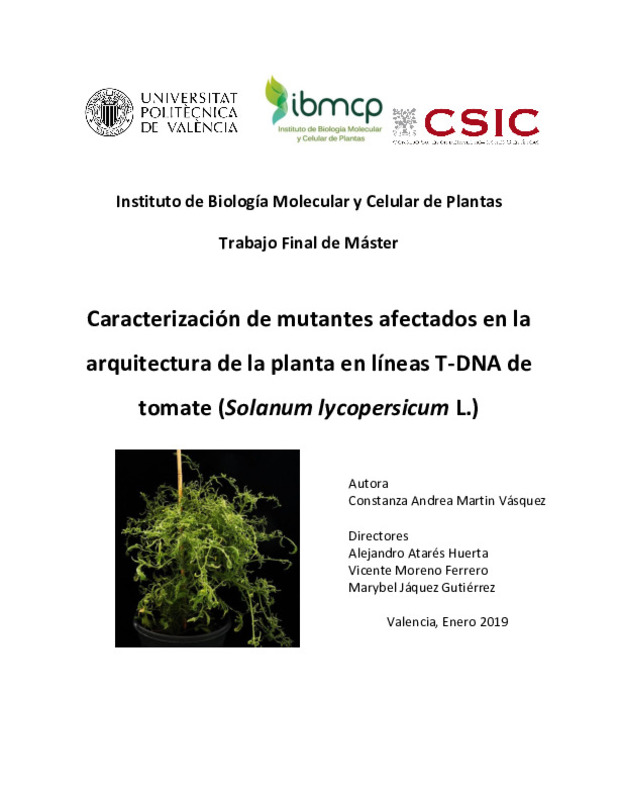JavaScript is disabled for your browser. Some features of this site may not work without it.
Buscar en RiuNet
Listar
Mi cuenta
Estadísticas
Ayuda RiuNet
Admin. UPV
Caracterización de mutantes afectados en la arquitectura de la planta en líneas T-DNA de tomate
Mostrar el registro sencillo del ítem
Ficheros en el ítem
| dc.contributor.advisor | Atarés Huerta, Alejandro
|
es_ES |
| dc.contributor.advisor | Moreno Ferrero, Vicente
|
es_ES |
| dc.contributor.advisor | Jáquez Gutiérrez, Marybel
|
es_ES |
| dc.contributor.author | Martín Vásquez, Constanza
|
es_ES |
| dc.date.accessioned | 2019-04-01T09:41:33Z | |
| dc.date.available | 2019-04-01T09:41:33Z | |
| dc.date.created | 2019-01-31 | es_ES |
| dc.date.issued | 2019-04-01 | es_ES |
| dc.identifier.uri | http://hdl.handle.net/10251/118820 | |
| dc.description.abstract | [ES] La deteccción de mutantes con alguna alteración en la arquitectura de la planta es la mejor estrategia para identificar los genes que controlan diversos caracteres relacionados con este aspecto del desarrollo vegetativo. Entre las alternativas posibles para generar mutantes (e.g. radiaciones, productos químicos como EMS, etc.), la mutagénesis insercional es la más adecuada para abordar este objetivo. Con esta estrategia, tras la obtención de un gran número de plantas transgénicas, se evalúa su fenotipo para poder detectar alteraciones causadas por la integración del T-DNA. De esta manera, si el gen endógeno queda etiquetado por el T-DNA, se puede llegar a la clonación del gen mediante métodos basados en la PCR (e.g. Anchor- o Tail-PCR), lo que proporciona una valiosa información sobre el papel de ese gen en el carácter evaluado. El desarrollo de un protocolo eficaz de transformación genética en tomate y especies silvestres relacionadas (Solanum pimpinellifolium, S. pennellii, S. galapagense) ha permitido la obtención de unas 7800 líneas T-DNA en el contexto de varios proyectos. Se ha realizado el escrutinio de estas colecciones de líneas T-DNA para identificar mutantes con alteraciones en caracteres del desarrollo vegetativo y reproductivo, así como en el nivel de tolerancia a estreses abióticos, principalmente salinidad y sequía. La detección y caracterización de mutantes se ha realizado tanto in vivo (i.e. invernadero) como mediante técnicas de cultivo in vitro. En el presente trabajo se han caracterizado líneas T-DNA mutantes, que se habían identificado previamente en nuestro grupo, con alteraciones en diferentes aspectos de la arquitectura de la planta, como crecimiento, ramificación y morfología de la hoja. | es_ES |
| dc.description.abstract | [EN] Detection of mutants with some alteration in the architecture of the plant is the best strategy to identify the genes that control different characters related to this aspect of vegetative development. Among the possible alternatives to generate mutants (e.g., radiations, chemical products such as EMS, etc.), insertional mutagenesis is the most appropriate to address this objective. With this strategy, after obtaining a large number of transgenic plants, their phenotype is evaluated in order to detect alterations caused by the integration of T-DNA. In this way, if the endogenous gene is labeled by T-DNA, it is possible to reach cloning of the gene by means of PCR-based methods (eg Anchor- or Tail-PCR), which provides valuable information on the role of that gene in the evaluated character. The development of an efficient genetic transformation protocol in tomato and related wild species (Solanum pimpinellifolium, S. pennellii, S. galapagense) has allowed obtaining some 7800 T-DNA lines in the context of several projects. We screened these collections of T-DNA lines to identify mutants with alterations in characters of vegetative and reproductive development, as well as in the level of tolerance to abiotic stresses, mainly salinity and drought. The detection and characterization of mutants has been carried out both in vivo (greenhouse i.e.) and by in vitro culture techniques. In the present work, mutant T-DNA lines have been characterized, which had previously been identified in our group, with alterations in different aspects of the plant architecture, such as growth, branching and leaf morphology. | en_EN |
| dc.language | Español | es_ES |
| dc.publisher | Universitat Politècnica de València | es_ES |
| dc.rights | Reserva de todos los derechos | es_ES |
| dc.subject | Mutagénesis insercional | es_ES |
| dc.subject | Cultivo in vitro | es_ES |
| dc.subject | Tomate | es_ES |
| dc.subject | Arquitectura de la planta | es_ES |
| dc.subject | Insertional mutagenesis | en_EN |
| dc.subject | In vitro culture | en_EN |
| dc.subject | Tomato | en_EN |
| dc.subject | Plant architecture | en_EN |
| dc.subject.classification | GENETICA | es_ES |
| dc.subject.other | Máster Universitario en Biotecnología Molecular y Celular de Plantas-Màster Universitari en Biotecnologia Molecular i Cel·Lular de Plantes | es_ES |
| dc.title | Caracterización de mutantes afectados en la arquitectura de la planta en líneas T-DNA de tomate | es_ES |
| dc.type | Tesis de máster | es_ES |
| dc.rights.accessRights | Abierto | es_ES |
| dc.contributor.affiliation | Universitat Politècnica de València. Departamento de Biotecnología - Departament de Biotecnologia | es_ES |
| dc.description.bibliographicCitation | Martín Vásquez, C. (2019). Caracterización de mutantes afectados en la arquitectura de la planta en líneas T-DNA de tomate. http://hdl.handle.net/10251/118820 | es_ES |
| dc.description.accrualMethod | TFGM | es_ES |
| dc.relation.pasarela | TFGM\101962 | es_ES |






